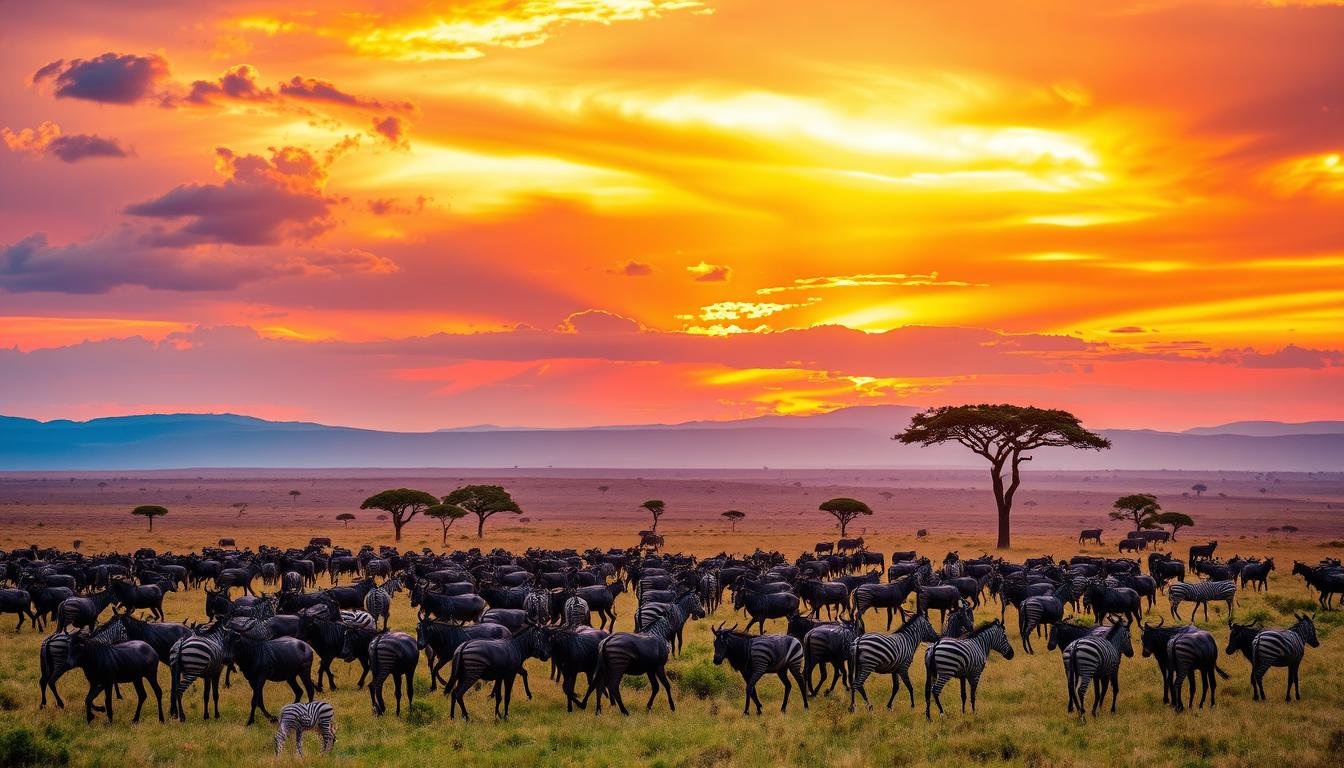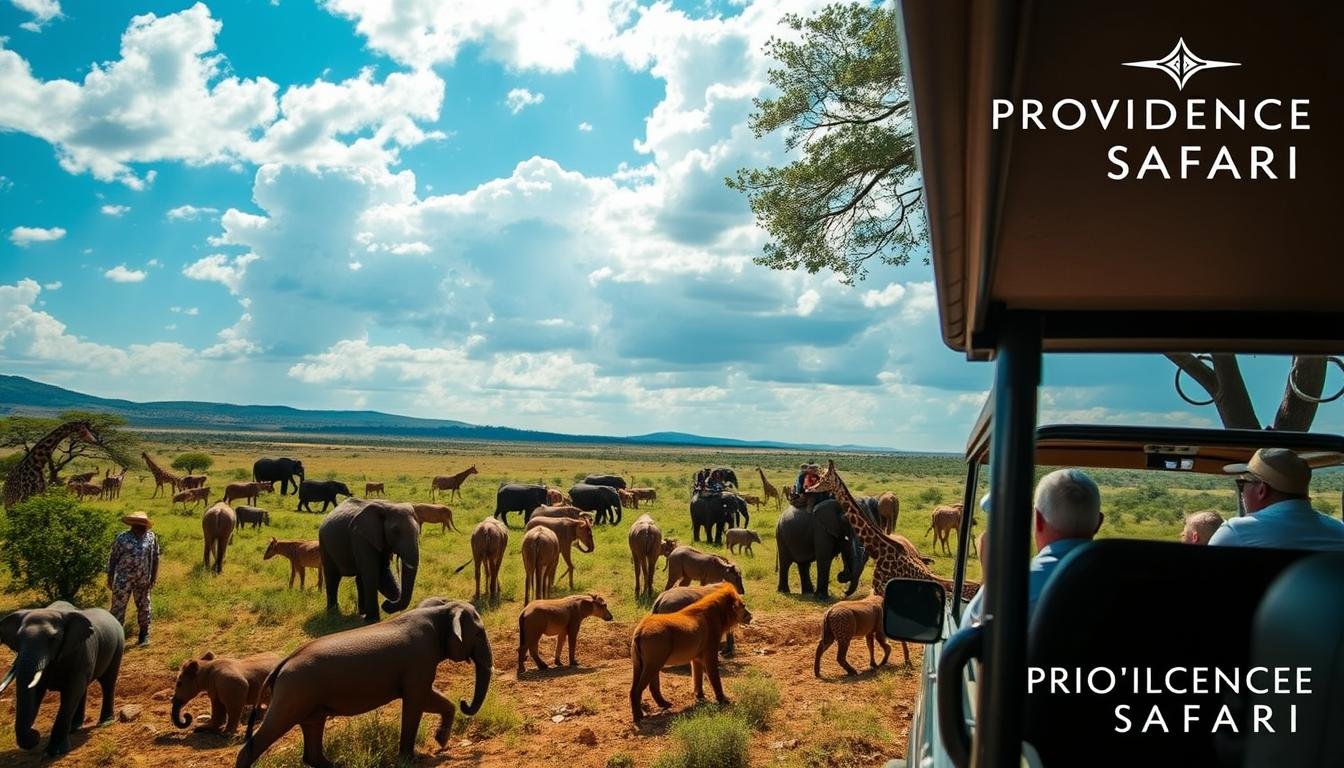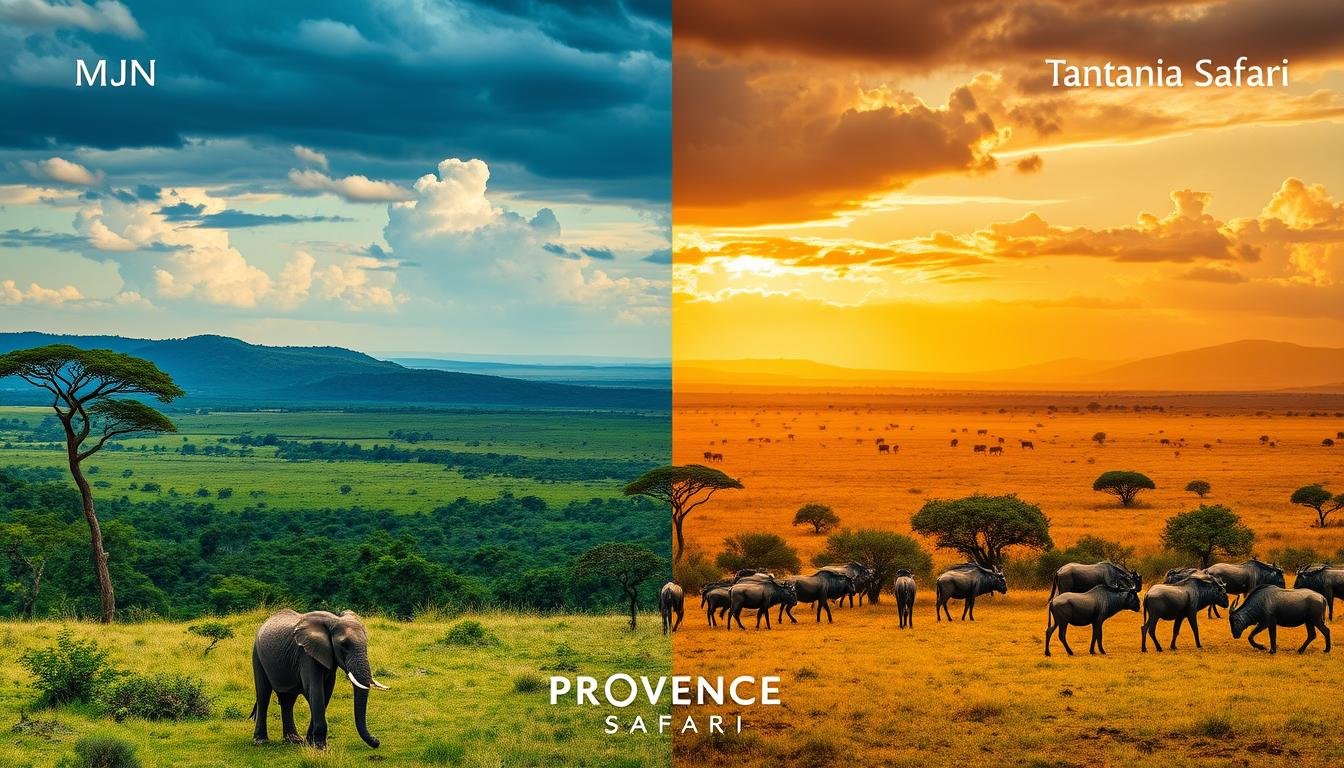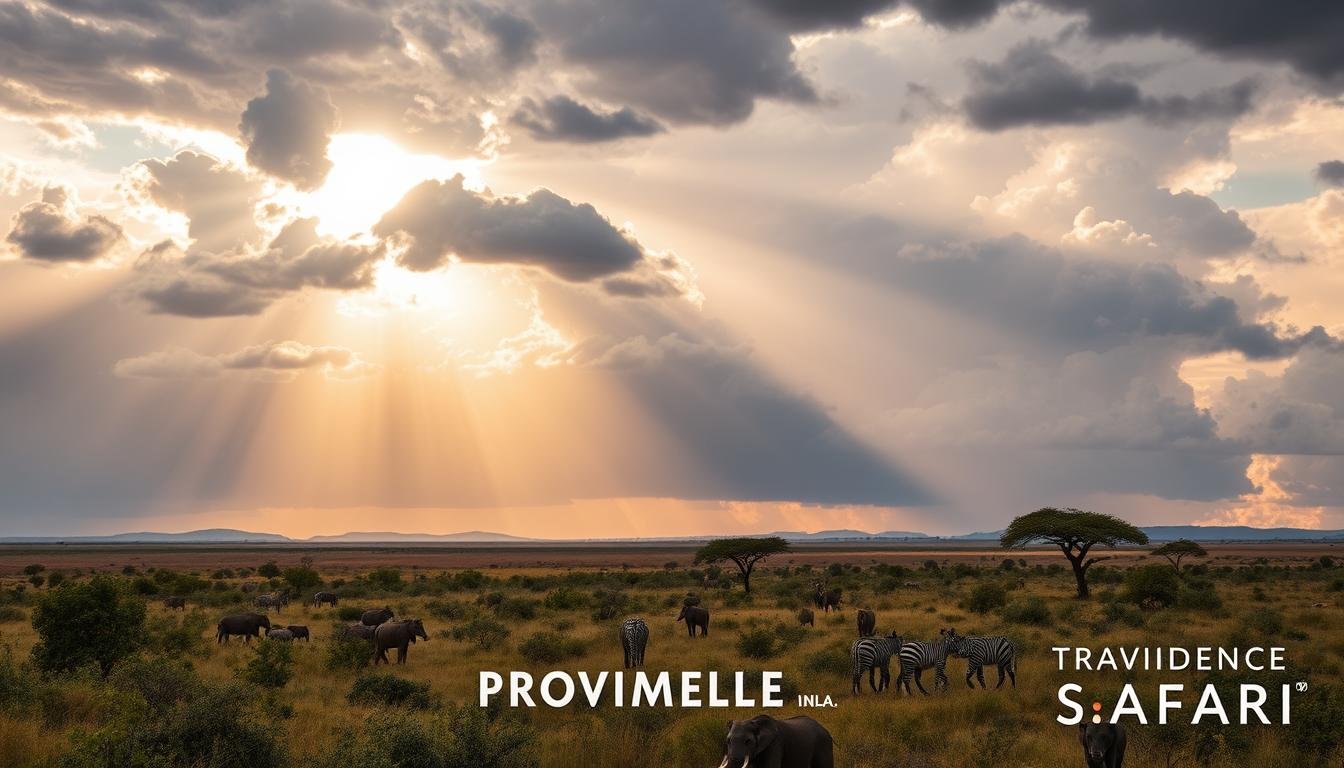Tanzania has two main seasons: the dry season and the wet season. The dry season is from June to October, with little rain and cooler temps. The wet season, from November to May, brings more rain and warmer weather. These seasons greatly affect wildlife behavior and your safari experience.
“The rhythm of the seasons in Tanzania is the heartbeat of the wild, guiding the movements and behaviors of the animals that call this land home.” The dry season in Tanzania from June to October is the best time for a safari.
In the wet season, Tanzania’s national parks come alive. The countryside turns emerald green, and newborn animals abound. Rain showers are common, but sunshine breaks through too.
Planning a trip to Tanzania in the low season has many perks. It means fewer crowds, a closer look at wildlife and landscapes. This time is great for a more personal safari experience.
The Great Migration is one of the most awe-inspiring natural wonders on Earth. The seasons in Tanzania are changing due to climate change. Rainy and dry seasons are becoming less predictable, making it harder to plan a safari.
Planning a Tanzania safari can be overwhelming with so many national parks to choose from. Each park has its own wildlife experiences and best times to visit. It’s important to pick the right park based on your travel preferences and the time of year.
The best tanzania safari months for families depend on the kids’ ages and what they like. The when to go on tanzia safari can change, but the dry season is usually best for families. This is from June to October.
The best time to climb Mount Kilimanjaro is from June to October and December to March. The dry seasons match up with cultural festivals and celebrations. Tanzania has many indigenous tribes and communities.
These festivals can make your trip better, but they might change your plans. Big crowds can make finding places to stay and travel harder. It’s smart to check the event schedule before you go.
In the wet season, malaria risk goes up. Talk to your doctor about taking antimalarial meds. Check if you need any special vaccinations for your trip.

14 Nov
Going on a Tanzania safari is an adventure you’ll never forget. You’ll see amazing landscapes, diverse wildlife, and rich culture. But, picking the right time to go is key for a great safari. Best time for Tanzania Safari: This guide will help you find the best time, considering weather, wildlife, and tourist seasons.
Key Takeaways
- Understand the impact of Tanzania’s climate and seasons on safari planning
- Discover the advantages and considerations of visiting during the dry and wet seasons
- Plan your safari around the best times to witness the Great Migration
- Explore how climate change is affecting safari experiences in Tanzania
- Determine the optimal timing for family-friendly safaris and adventure activities
Understanding Tanzania’s Climate and Seasons
Tanzania’s diverse landscape and geography make its climate unique. This climate is key to planning the perfect safari. Knowing the tanzania safari climate and tanzania safari weather is crucial. It helps you make the most of your wildlife viewing.
Overview of Tanzanian Weather Patterns
Tanzania has two main seasons: the dry season and the wet season. The dry season is from June to October, with little rain and cooler temps. The wet season, from November to May, brings more rain and warmer weather.
These seasons greatly affect wildlife behavior and your safari experience. Planning your trip for the best tanzania safari seasons ensures a great adventure.
The Importance of Seasons in Safari Planning
- The dry season is great for spotting animals, as they gather at water sources.
- The wet season is perfect for birdwatching, with many migratory birds and lush greenery.
- Some parks, like the Serengeti, have special events like the Great Migration that affect when to go.
Understanding Tanzania’s tanzania safari climate, tanzania safari weather, and tanzania safari seasons helps plan your safari. This way, you can see the amazing wildlife that makes Tanzania special.
> “The rhythm of the seasons in Tanzania is the heartbeat of the wild, guiding the movements and behaviors of the animals that call this land home.”
Dry Season: The Best Time for Game Viewing
The dry season in Tanzania is the best time for a safari. Animals gather at the few water sources, making them easy to see. The weather is also perfect, with clear skies and mild temperatures.
When Does the Dry Season Occur?
The dry season in Tanzania is from June to October. July and August are the peak months. This is when there’s the least rain, perfect for wildlife watching.
Wildlife Behavior During Dry Season
Wildlife behavior changes in the dry season. Animals gather near water, making it easy to watch them. Without thick foliage, you can see animals like tanzania safari dry season lions and leopards more clearly.
Best Parks to Visit in Dry Season
- Serengeti National Park: It’s stunning in the dry season. You can see the Big Five and the wildebeest migration here.
- Ngorongoro Crater: The crater offers great game viewing in the dry months. Animals gather around the lake and marshes.
- Tarangire National Park: It’s known for its diverse wildlife. In the best months for tanzania safari, you can see baobab trees and large elephant herds.
> “The dry season in Tanzania is a wildlife lover’s dream, with animals converging around the limited water sources and the landscape offering unparalleled visibility for exceptional game viewing.”
Wet Season: Unique Safari Experiences
The Tanzania safari wet season is often missed by travelers. Yet, it offers a world of unique experiences for the bold safari-goer. With lush landscapes and endless birdwatching, it’s a captivating alternative to the dry season.
Exploring the Benefits of the Wet Season
In the wet season, Tanzania’s national parks come alive. The countryside turns emerald green, and newborn animals abound. It’s a prime time to see the circle of life, with predators and prey roaming the lush terrain.
Birdwatching Opportunities
Birdwatchers will love the Tanzania safari wet season. Migratory birds fill the skies, offering a colorful spectacle. From lilac-breasted rollers to martial eagles, Tanzania’s birds are in full display. Visitors can enjoy this avian show, capturing memories with binoculars and cameras.
What to Expect in the Rainy Season
The Tanzania safari months of the wet season are beautiful but wet. Rain showers are common, but sunshine breaks through too. Guides adapt to the weather, ensuring a great safari experience.
Exploring the Tanzania safari wet season reveals a hidden side of the country. It’s a chance to see newborn wildlife and enjoy birdwatching in lush landscapes. The wet season offers a memorable safari adventure.
Peak Safari Season: Planning Around Crowds
The tanzania safari peak season is very appealing, especially during the dry season and summer holidays. Tanzania’s national parks buzz with life as tourists from everywhere come to see the wildlife and landscapes. But, planning is key to enjoying your tanzania safari fully during this busy time.
When is Peak Tourist Season?
The peak tourist season in Tanzania is from June to October, the dry season. This is the best time for safaris because the animals are easier to see. The summer holidays in the Northern Hemisphere, especially July and August, also bring many visitors.
Tips for Visiting During Peak Times
- Book your stay and safari early to get the best prices and spots.
- Expect big crowds at famous spots and be patient, especially during busy times.
- Try visiting less crowded parks or areas to avoid the crowds.
- Be flexible with your plans and look for unique experiences, like cultural visits, to add to your safari.
- Remember to stay patient and positive – the amazing wildlife views are worth the wait.
With early planning and a bit of flexibility, you can have a great tanzania safari even in the peak season. By exploring less crowded places, you’ll make the most of your trip to this incredible place.

Low Season: Off-Peak Advantages
Planning a Tanzania safari in the low season has many perks. It means fewer crowds, better deals, and a closer look at wildlife and landscapes. This time is perfect for a more personal safari experience.
Benefits of Traveling in Low Season
Visiting Tanzania in the low season means avoiding big crowds. This makes for a quieter, more personal safari. You’ll also get better views of wildlife. Plus, the rainy season brings amazing birdwatching and green landscapes.
Finding Better Deals on Tours and Lodging
Traveling in the low season can save you money. Safari operators and lodges offer discounts when there are fewer visitors. This lets you spend more on your safari or stay in better places.
Looking for a unique wildlife experience or a budget-friendly trip? The low season is great for a tanzania safari. It’s a chance to see the country’s wonders without the crowds. By choosing the right time, we can make our when to go on tanzania safari unforgettable.
The Great Migration: Timing Your Safari
The Great Migration is a wildlife spectacle that draws many to Tanzania. It’s the annual movement of wildebeest, zebra, and other animals across the Serengeti. To see this, you need to know the migration cycle and plan your safari right.
Understanding the Migration Cycle
The Great Migration follows the rains and grazing lands. Wildebeest and zebra move in a clockwise direction. Their paths change throughout the year, making it exciting for safari-goers.
Ideal Times to Witness the Migration
- January to March, the herds are in the southern Serengeti, calving and enjoying the green landscapes.
- April to June, they start moving north, crossing the Grumeti River. This is a dramatic sight.
- July to October, they’re in the northern Serengeti and Maasai Mara. August and September are the peak months.
- As the year ends, they return to the southern Serengeti, ending the cycle.
By planning your Tanzania safari for the best times, you’ll see the Great Migration at its best. Knowing the best time for tanzania safari and the migration’s patterns is key for a memorable trip.
> “The Great Migration is one of the most awe-inspiring natural wonders on Earth, a true testament to the resilience and endurance of these magnificent animals.”
Impact of Climate Change on Safari Planning
Climate change is affecting Tanzania’s wildlife and seasons. It’s important for those planning a safari to understand these changes.
Changes to Wildlife Patterns
Climate change is changing how Tanzania’s wildlife moves and behaves. Warmer temperatures and unpredictable rainfall are changing where animals find food and water. This means animals are moving differently, making it harder to know where to see them.
Shifts in Seasonal Timing
The seasons in Tanzania are also changing due to climate change. Rainy and dry seasons are becoming less predictable, with some regions experiencing more erratic weather patterns. This makes it harder to plan the best time for a safari.
To have a great safari in Tanzania, you need to adapt to these changes. Knowing the latest tanzania safari climate and tanzania safari weather trends helps. This way, you can see the amazing wildlife and landscapes Tanzania has to offer.
How to Choose Between National Parks
Planning a Tanzania safari can be overwhelming with so many national parks to choose from. Each park has its own wildlife experiences and best times to visit. It’s important to pick the right park based on your travel preferences and the time of year.
Key Differences Among Tanzania’s National Parks
Tanzania has many national parks, each with its own charm. The Serengeti is famous for the wildebeest migration. The Ngorongoro Crater is known for its dense wildlife. Tarangire is home to many elephants, and Ruaha is great for seeing predators.
Best Times to Visit Each National Park
- Serengeti National Park: The best time to see the wildebeest migration is from June to October. This is when they move through the park looking for food and water.
- Ngorongoro Crater: You can see a lot of wildlife here all year, but the dry season from June to October is the best. It’s when you can spot many different species.
- Tarangire National Park: The dry months from June to October are the best time to see the park’s famous elephants. Other animals also gather at the water sources during this time.
- Ruaha National Park: This park is best visited from June to November. During the dry season, predators and prey gather at the water sources, making for great wildlife watching.
Knowing the best times and highlights of Tanzania’s national parks helps you choose the perfect destination for your tanzania safari seasons and best months for tanzania safari.
National ParkBest Time to VisitHighlights
Serengeti
June – October
Wildebeest migration
Ngorongoro Crater
June – October
High wildlife density
Tarangire
June – October
Large elephant herds
Ruaha
June – November
Predator sightings
Family Safaris: Timing for Travelers with Kids
Planning a family safari in Tanzania needs careful thought to make it fun for everyone. The time you choose for your trip greatly affects what you can do and see. So, it’s important to think about when to go on tanzania safari.
Age-Appropriate Safari Considerations
The best tanzania safari months for families depend on the kids’ ages and what they like. Young kids might like gentle game drives and fun wildlife meetings. Older kids might prefer tough hikes or learning about local cultures.
It’s key to pick safari activities that fit your family’s needs and skills. This means choosing places to stay and adventures that are right for your family.
Best Seasons for Family-Friendly Safaris
The when to go on tanzania safari can change, but the dry season is usually best for families. This is from June to October. The weather is nice, and animals are easier to see.
Also, many schools in the US and Europe have summer breaks then. This makes it a great time for family safaris. But, it’s also the busiest time, so book early.
Finding the perfect time for your family’s safari in Tanzania depends on many things. Think about your kids’ ages, interests, and what you want to do. Talking to safari experts can help make your trip unforgettable and right for your family.
Adventure Activities to Consider in Tanzania
Planning a Tanzania safari? Don’t just stick to wildlife watching. Tanzania has lots of adventure activities and cultural experiences to make your trip better. Let’s look at some top options for your itinerary and the best times to visit.
Incorporating Mount Kilimanjaro Climbs
For those who love adventure, climbing Mount Kilimanjaro is a must. The best time to climb is during the dry seasons, from June to October and December to March. The weather is clearer, with less rain.
Be ready for the climb’s physical challenges. Also, make sure to acclimatize to the high altitude properly.
Cultural Experiences and Their Timing
Tanzania has many indigenous tribes and communities. Each has its own culture. To experience these cultures fully, visit during the best time for tanzania safari.
The dry seasons match up with cultural festivals and celebrations. You can see vibrant dances, traditional ceremonies, and crafts. Notable events include the Ngorongoro Cultural Festival in June and the Mto wa Mbu Cultural Tourism Program, available all year.
Whether you want to climb Mount Kilimanjaro or explore Tanzania’s cultures, these activities will make your tanzania safari seasons trip unforgettable. Timing your visit right lets you make lasting memories and connect deeply with this amazing place.

ActivityBest Time
Mount Kilimanjaro Climb
June to October, December to March
Ngorongoro Cultural Festival
June
Mto wa Mbu Cultural Tourism Program
Year-round
Local Festivals and Events to Experience
Tanzania is full of vibrant culture. Throughout the year, it hosts many festivals and events. These can make your tanzania safari months or when to go on tanzania safari trip even better. You’ll get to see music, dance, and traditional ceremonies that show the heart of Tanzania.
Major Festivals in Tanzania
The Sauti za Busara music festival in Zanzibar is a big deal. It celebrates East Africa’s music with famous and new artists. The Mwaka Kogwa Festival in Kilwa Masoko is another highlight. It’s a four-day party for the Shirazi New Year.
The Serengeti Wildebeest Migration Festival is great for wildlife lovers. It’s about the Great Migration, a natural wonder. You’ll learn about its importance and how to protect the Serengeti.
How Events Affect Safari Plans
These festivals can make your trip better, but they might change your plans. Big crowds can make finding places to stay and travel harder. It’s smart to check the event schedule before you go.
Adding festivals to your trip lets you dive into Tanzania’s culture. You can see the Great Migration or enjoy Zanzibar’s music. Tanzania has many events for every traveler.
FestivalLocationTimingDescription
Sauti za Busara
Zanzibar
February
A renowned music festival showcasing the diverse musical traditions of East Africa.
Mwaka Kogwa Festival
Kilwa Masoko
July
A four-day celebration of the Shirazi New Year, featuring traditional rituals and festivities.
Serengeti Wildebeest Migration Festival
Serengeti National Park
July-October
A celebration of the Great Migration, offering educational and conservation-focused events.
Preparing for a Successful Safari
Going on a Tanzania safari is a unique adventure. But, getting ready is crucial for a great trip. Whether it’s the tanzania safari weather in the dry season or the tanzania safari climate in the wet season, there are key things to remember.
Packing Essentials for Different Seasons
The tanzania safari weather and tanzania safari climate change a lot throughout the year. So, it’s important to pack right. In the dry season, wear light, breathable clothes to stay cool. Remember to pack sun protection like hats, sunglasses, and sunscreen.
In the wet season, bring layers and rain gear to keep dry. This way, you’re ready for any weather.
- Comfortable, lightweight clothing
- Sun protection (hats, sunglasses, sunscreen)
- Warm layers for cool evenings
- Rain jacket and waterproof shoes for the wet season
- Binoculars for wildlife viewing
- Camera and extra batteries/memory cards
Health Precautions Based on Timing
Your health matters a lot when it comes to the tanzania safari climate and tanzania safari weather. In the wet season, malaria risk goes up. Talk to your doctor about taking antimalarial meds. Also, check if you need any special vaccinations for your trip.
Health ConsiderationDry SeasonWet Season
Malaria
Moderate risk
Increased risk
Recommended Vaccinations
Routine vaccinations
Yellow fever, typhoid, hepatitis A and B
Hydration
Crucial to stay hydrated
Easier to maintain hydration
By packing the right things and taking care of your health, you’ll have a great Tanzania safari, no matter the season.

Conclusion: Finding Your Best Safari Timing
Reflecting on the best time for a Tanzania safari, we see it’s not simple. The ideal time varies based on your likes, the safari type, and when you can travel.
Reflecting on Personal Preferences
Think about what matters most to you. Do you want to see lots of wildlife or experience local culture? Prefer green landscapes or the dry season’s views? Knowing your preferences helps pick the perfect time for your safari.
Final Tips for Planning Our Dream Safari
Planning a Tanzania safari? A few tips can make it unforgettable. Be open with your travel dates for better options and deals. Also, check the weather and wildlife migrations to see the best sights. Lastly, choose a trusted safari operator for tailored advice and planning.
